
The MaloideaeC.Weber was the apple subfamily, a grouping used by some taxonomists within the rose family, Rosaceae. Recent molecular phylogenetic evidence has shown that the traditional Spiraeoideae and Amygdaloideae form part of the same clade as the traditional Maloideae, and the correct name for this group is Amygdaloideae. Earlier circumscriptions of Maloideae are more-or-less equivalent to subtribe Malinae or to tribe Maleae. The group includes a number of plants bearing commercially important fruits, such as apples and pears, while others are cultivated as ornamentals.
Stigmella oxyacanthella is a moth of the family Nepticulidae, found in Europe. The larvae are leaf miners feeding inside the leaves of trees and shrubs.
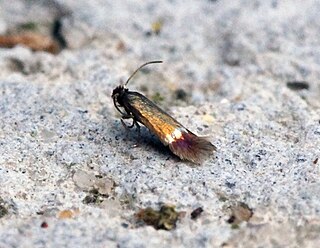
Stigmella hybnerella is a moth of the family Nepticulidae. It is found in all of Europe, in North Africa, the Near East, and the eastern part of the Palearctic realm.

Stigmella mespilicola is a moth of the family Nepticulidae. It is found from Germany to the Iberian Peninsula, Italy and Macedonia and from Great Britain to Ukraine.

Stigmella sorbi is a moth of the family Nepticulidae. It is found in most of Europe, east to the eastern part of the Palearctic realm.

Stigmella magdalenae is a moth of the family Nepticulidae. It is found from Scandinavia and Finland to the Pyrenees, Italy and Bulgaria, and from Ireland to central Russia and Ukraine.

Leucoptera malifoliella, the pear leaf blister moth, ribbed apple leaf miner or apple leaf miner, is a moth of the Lyonetiidae family that can be found in all of Europe.

Lyonetia prunifoliella is a moth in the family Lyonetiidae.
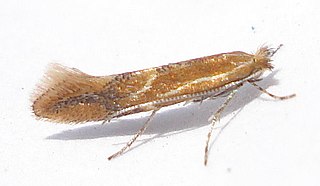
The hawthorn red midget moth is a moth of the family Gracillariidae. It is found in all of Europe.

Phyllonorycter mespilella is a moth of the family Gracillariidae. It is found from Germany to the Iberian Peninsula, Sardinia, Italy and the Carpathian Mountains and from Ireland to southern Russia. It also occurs over much of western North America, from California north to British Columbia, and east to Utah and New Mexico.

Phyllonorycter sorbi is a moth of the family Gracillariidae. It is known from all of Europe, except the Balkan Peninsula.

Parornix scoticella is a moth of the family Gracillariidae. It is known from all of Europe.
Callisto pfaffenzelleri is a moth of the family Gracillariidae. It is known from the Alps and Slovenia.
Coleophora trigeminella is a moth of the family Coleophoridae. It is found in most of Europe, except Ireland, the Balkan Peninsula and the Mediterranean islands.
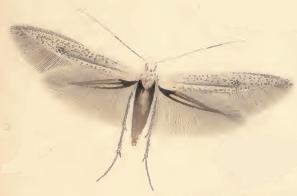
The fruit tree case moth is a moth of the family Coleophoridae, found in western Europe.

Coleophora prunifoliae is a moth of the family Coleophoridae. It is found from Scandinavia to the Pyrenees, Italy and Romania and from Great Britain to southern Russia.

The Maleae are the apple tribe in the rose family, Rosaceae. The group includes a number of plants bearing commercially important fruits, such as apples and pears, while others are cultivated as ornamentals. Older taxonomies separated some of this group as tribe Crataegeae, as the Cydonia group, or some genera were placed in family Quillajaceae.

Malinae is the name for the apple subtribe in the rose family, Rosaceae. This name is required by the International Code of Nomenclature for algae, fungi, and plants, which came into force in 2011 for any group at the subtribe rank that includes the genus Malus but not either of the genera Rosa or Amygdalus. The group includes a number of plants bearing commercially important fruits, such as apples and pears, while others are cultivated as ornamentals.
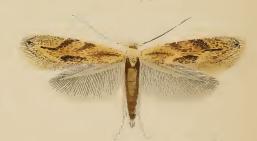
Bucculatrix bechsteinella is a moth of the family Bucculatricidae. It was described by Johann Matthäus Bechstein and Georg Ludwig Scharfenberg in 1805. It is found in most of Europe, except Greece and Bulgaria.
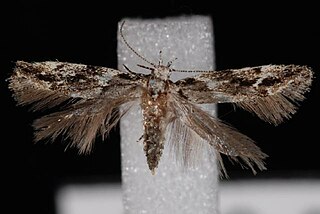
Recurvaria nanella, the lesser bud moth, is a moth of the family Gelechiidae. It is widely distributed in Europe and is also found in Turkey, the Near East, North Africa, the Caucasus, Transcaucasia, Kazakhstan and south-eastern Siberia. It is also found in North America, where it is probably introduced.











